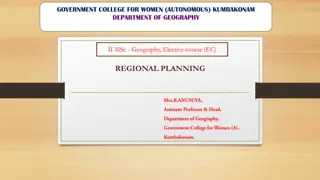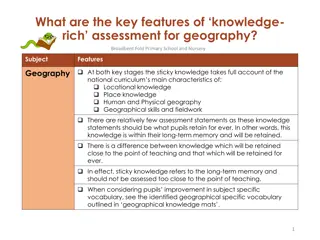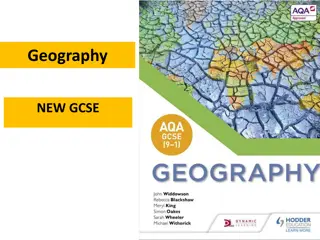The Importance of Fieldwork in Geography
Fieldwork in geography involves observing and collecting data about people, cultures, and natural environments in real-world settings. It allows for practical experiences that reinforce classroom learning, enhance knowledge, skills, and understanding, and encourage geographical inquiry and higher-order thinking. Fieldwork is essential for students to develop and extend their geographical thinking, adding clear value to their learning experience.
Download Presentation

Please find below an Image/Link to download the presentation.
The content on the website is provided AS IS for your information and personal use only. It may not be sold, licensed, or shared on other websites without obtaining consent from the author.If you encounter any issues during the download, it is possible that the publisher has removed the file from their server.
You are allowed to download the files provided on this website for personal or commercial use, subject to the condition that they are used lawfully. All files are the property of their respective owners.
The content on the website is provided AS IS for your information and personal use only. It may not be sold, licensed, or shared on other websites without obtaining consent from the author.
E N D
Presentation Transcript
FIELD WORK IN GEOGRAPHY IMPORTANCE
Field work is the process of observing and collecting data about people, cultures, and natural environments. Field work is conducted in the wild of our everyday surroundings rather than in the semi-controlled environments of a lab or classroom. This allows researchers to collect data about the dynamic places, people, and species around them. Field work enables students and researchers to examine the way scientific theories interact with real life. Field work is important in both the social and natural sciences. Social sciences, such as economics or history, focus on people, culture, and society. Natural sciences, such as biology or chemistry, focus on physical characteristics of nature and natural environments.
The Value of Field Work in the Geosciences Fieldwork provides an 'unparalleled opportunity' to study the real world; Student perceptions of field work tend to be overwhelmingly positive; Fieldwork provides the opportunity to reinforce classroom-based learning; It increases students' knowledge, skills and subject understanding. In the field setting, students have the opportunity to learn FROM Nature and ABOUT Science as a social enterprise...
Well planned fieldwork in geography adds clear value to learning in the subject as well as providing a positive contribution to the wider curriculum. Students gain first-hand, practical experiences which support and reinforce knowledge, skills and concepts explored in the classroom. Memorable experiences support long-term learning and recall. Good fieldwork encourages geographical enquiry and frequently can lead to higher-order thinking and learning.
Why is fieldwork important in geography? Fieldwork is an essential ingredient of geography because it provides a real-world opportunity for students to develop and extend their geographical thinking. it adds value to classroom experiences. The outdoors is a resource for geographical learning and fieldwork should be planned as part of the geography curriculum, not added on as a special activity. Geography fieldwork is very much hands on ; when students are involved in fieldwork enquiries they are collecting primary data; formulating questions to investigate; seeking answers to their questions; and communicating their findings.
There is widespread agreement among teachers, parents and politicians that fieldwork is beneficial; unfortunately, this is not enough to guarantee the place of fieldwork in the curriculum. There has been a marked decline in fieldwork provision. in recent years UNIVERSITIES are increasingly reluctant to allow fieldwork for a number of reasons. college timetable pressures, reduced funding, anxieties about safety are all seen as barriers to fieldwork























